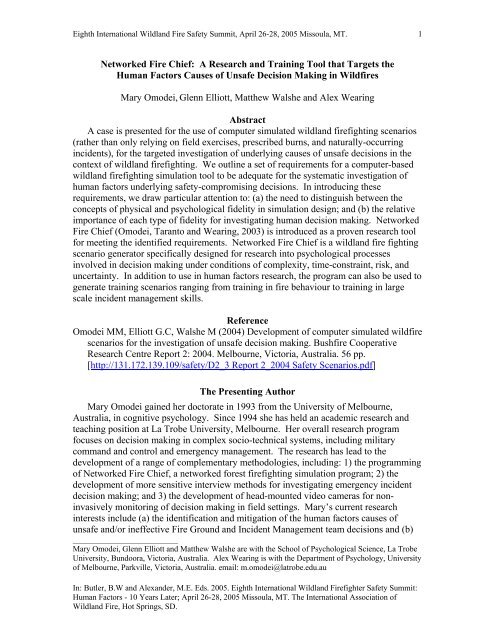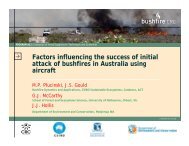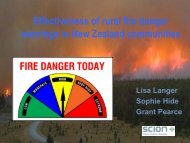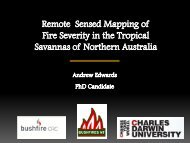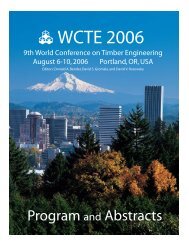Networked Fire Chief - Bushfire Cooperative Research Centre
Networked Fire Chief - Bushfire Cooperative Research Centre
Networked Fire Chief - Bushfire Cooperative Research Centre
You also want an ePaper? Increase the reach of your titles
YUMPU automatically turns print PDFs into web optimized ePapers that Google loves.
Eighth International Wildland <strong>Fire</strong> Safety Summit, April 26-28, 2005 Missoula, MT. 1<br />
<strong>Networked</strong> <strong>Fire</strong> <strong>Chief</strong>: A <strong>Research</strong> and Training Tool that Targets the<br />
Human Factors Causes of Unsafe Decision Making in Wildfires<br />
Mary Omodei, Glenn Elliott, Matthew Walshe and Alex Wearing<br />
Abstract<br />
A case is presented for the use of computer simulated wildland firefighting scenarios<br />
(rather than only relying on field exercises, prescribed burns, and naturally-occurring<br />
incidents), for the targeted investigation of underlying causes of unsafe decisions in the<br />
context of wildland firefighting. We outline a set of requirements for a computer-based<br />
wildland firefighting simulation tool to be adequate for the systematic investigation of<br />
human factors underlying safety-compromising decisions. In introducing these<br />
requirements, we draw particular attention to: (a) the need to distinguish between the<br />
concepts of physical and psychological fidelity in simulation design; and (b) the relative<br />
importance of each type of fidelity for investigating human decision making. <strong>Networked</strong><br />
<strong>Fire</strong> <strong>Chief</strong> (Omodei, Taranto and Wearing, 2003) is introduced as a proven research tool<br />
for meeting the identified requirements. <strong>Networked</strong> <strong>Fire</strong> <strong>Chief</strong> is a wildland fire fighting<br />
scenario generator specifically designed for research into psychological processes<br />
involved in decision making under conditions of complexity, time-constraint, risk, and<br />
uncertainty. In addition to use in human factors research, the program can also be used to<br />
generate training scenarios ranging from training in fire behaviour to training in large<br />
scale incident management skills.<br />
Reference<br />
Omodei MM, Elliott G.C, Walshe M (2004) Development of computer simulated wildfire<br />
scenarios for the investigation of unsafe decision making. <strong>Bushfire</strong> <strong>Cooperative</strong><br />
<strong>Research</strong> <strong>Centre</strong> Report 2: 2004. Melbourne, Victoria, Australia. 56 pp.<br />
[http://131.172.139.109/safety/D2_3 Report 2_2004 Safety Scenarios.pdf]<br />
The Presenting Author<br />
Mary Omodei gained her doctorate in 1993 from the University of Melbourne,<br />
Australia, in cognitive psychology. Since 1994 she has held an academic research and<br />
teaching position at La Trobe University, Melbourne. Her overall research program<br />
focuses on decision making in complex socio-technical systems, including military<br />
command and control and emergency management. The research has lead to the<br />
development of a range of complementary methodologies, including: 1) the programming<br />
of <strong>Networked</strong> <strong>Fire</strong> <strong>Chief</strong>, a networked forest firefighting simulation program; 2) the<br />
development of more sensitive interview methods for investigating emergency incident<br />
decision making; and 3) the development of head-mounted video cameras for noninvasively<br />
monitoring of decision making in field settings. Mary’s current research<br />
interests include (a) the identification and mitigation of the human factors causes of<br />
unsafe and/or ineffective <strong>Fire</strong> Ground and Incident Management team decisions and (b)<br />
__________________________<br />
Mary Omodei, Glenn Elliott and Matthew Walshe are with the School of Psychological Science, La Trobe<br />
University, Bundoora, Victoria, Australia. Alex Wearing is with the Department of Psychology, University<br />
of Melbourne, Parkville, Victoria, Australia. email: m.omodei@latrobe.edu.au<br />
In: Butler, B.W and Alexander, M.E. Eds. 2005. Eighth International Wildland <strong>Fire</strong>fighter Safety Summit:<br />
Human Factors - 10 Years Later; April 26-28, 2005 Missoula, MT. The International Association of<br />
Wildland <strong>Fire</strong>, Hot Springs, SD.
Eighth International Wildland <strong>Fire</strong> Safety Summit, April 26-28, 2005 Missoula, MT. 2<br />
the use of computer simulated wildfire scenarios for research and training in <strong>Fire</strong> Ground<br />
and Incident Management Team decision making. She is the leader of the “Safety in<br />
Decision Making and Behaviour” Project in the Australasian <strong>Bushfire</strong> <strong>Cooperative</strong><br />
<strong>Research</strong> <strong>Centre</strong> (see www.bushfirecrc.com) and is the coordinator of the Melbourne<br />
Complex Decision <strong>Research</strong> Group (see<br />
http://www.latrobe.edu.au/psy/research/cdrg/index.html).


